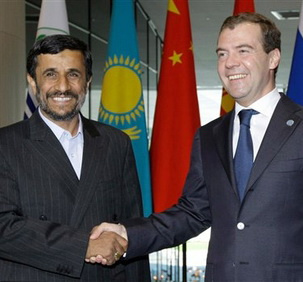Eastern Promises

To understand Russia’s recent behavior, we should take several factors into consideration. First of all, the international community is in a state of transition and it lacks an established structure. That makes the existing procedures, behaviors and agreements somehow transient. In these circumstances, a number of countries are vying for a more prominent position in the international community and that may undermine the credibility of some agreements.
Secondly, the world is in the post-new global period. During the 90s and after the Soviet Union dissolution the United States strived to form a unipolar order but its effort failed. The project never led to a product and led to catastrophes culminating in George W. Bush’s second term of presidency.
Thus, the United States adopted a new approach that which gave a more prominent role to other world powers. The new approach definitely aims to serve the country’s global interests, that is, it is a guise for the former approach. However, it gives incentives to other powerful states and tries to engage other political entities such as China, Russia and the European Union in solving global crises. Within the new approach, the United States is trying to define common interests between itself and those global powers, thus convincing them that threats against the US are in fact threats to the international community.
On the other hand, for countries such as Russia and China, national interests are the sole priority. Dealing with the United States and Iran are seen from this perspective. Confrontation or collaboration, the option is in favor as long as it serves their interests. That can justify Russia’s behavior vis-à-vis the United States throughout the past ten years.
Both countries, especially Russia, follow a pragmatist policy. This is observable in both Russian foreign policy documents and the remarks made by Russian leaders. They have explicitly stated that pragmatism has replaced ideology in their foreign policy. Hence, there is a condition to support for Iran. It is done as long as it serves Russia, or China’s, national interests.
Next, also the United States has changed its rhetoric and its policies, but we should not read too much into it. Back to China and Russia, they are influential countries who share long-term interests with Iran. Iran can be their strategic partner. They can collaborate to serve mutual interest and thus will have mutual expectations. Regional security will be established if Iran, China and Russia make joint efforts.
There is no need to say that in foreign diplomacy, we can’t exclusively rely on specific countries. The “No East, No West” principle has been a cornerstone of our Constitution and foreign diplomacy. What we should seek in our foreign policy, especially at the current circumstances, is to connect with as many countries as possible.
We may be disappointed with Russia’s frequent delays in fulfilling its promises on the Bushehr nuclear power plant or delivering the S300 missiles, but we should know that our northern neighbor is also under pressure and as it has informed us before, there is a limit for its resistance to US pressures. Russia has frequently asked Iran to reach an agreement with the international community so that the bilateral ties would remain intact. It is our responsibility to build trust and diversify our relations with other countries to gain the international community’s trust, prove our entitlement for a peaceful nuclear program and retain the level of our relations with key powers such as Russia and China.
Keywords: Iran-Russia relations. Iran-China relations. Iran’s nuclear program.

